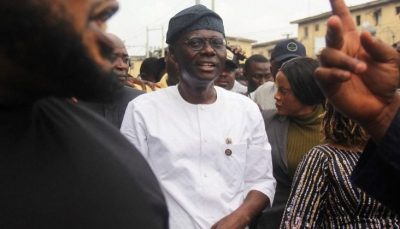
The Lagos Parliament rejected 17 commissioner-nominees out of the 39 names sent by Governor Babajide Sanwo-Olu. Speaker Mudashiru Obasa is behind the pushback, sparking fears of a power struggle in Africa’s largest city.
Professor Akin Abayomi, the former health commissioner lauded for his effective management of the Covid-19 pandemic in the state, was among the 17 nominees that parliament rejected. The lawmakers also declined five other individuals who had served as commissioners under the previous administration.
The move was unprecedented as it surprised not just observers, but also leaders of the All Progressives Congress (APC), the ruling party in Lagos. There has never been such a large number of rejections in the Lagos House of Assembly since 1999.
“It’s a disheartening turn of events,” Fouad Oki, a senior APC member, tells The Africa Report. “I can say, unequivocally, there’s more beneath the surface. We’re in discussions with party leaders to understand what went wrong. This outcome bodes ill for both the political and leadership landscape in Lagos.”
Bola Tinubu, who served as the governor of Lagos from 1999 to 2007, has been a dominant force in the state’s politics for over two decades. However, with Tinubu’s relocation to Abuja following his presidential win, analysts suggest a vacuum has been created, allowing his subordinates to assert their independence.
At the core of this power struggle are Governor Sanwo-Olu and Speaker Obasa. Sources indicate that the governor worked diligently to prevent Obasa’s third term as speaker. Obasa, having retained his position despite the governor’s efforts, is now believed to be seeking retribution.
“The speaker is laying the groundwork to succeed Sanwo-Olu,” an insider says. “Even though he is originally from Abeokuta, he’s made his gubernatorial ambitions clear to his close associates.”
Power play
Some of the rejected nominees were Sanwo-Olu’s choices, while others were put forward by President Tinubu’s Chief of Staff, Femi Gbajabiamila; the president’s wife Oluremi; and other influential factions within the APC.
At the 11th hour, Tinubu stepped in to retain him as speaker, overruling everyone else
In the run-up to the APC primaries last year, Sanwo-Olu sponsored various candidates to challenge the speaker’s influence, including in Obasa’s own Agege constituency. Although he somewhat succeeded, Obasa’s grip on his constituency remained steadfast.
Previous rejections
While the scale of these rejections is unparalleled, it is not entirely without precedent. In 1999, under Governor Tinubu, the assembly declined three nominees, including the father of the current deputy governor, Obafemi Hamzat. By 2003, however, the assembly had approved all of Tinubu’s 17 commissioner nominees.
Questions linger regarding the rejection of this year’s 17 nominees. Muslim groups protested claiming that the list lacks adequate representation. Only eight of the 39 nominees were from the Muslim community.
Speaker Obasa asserts that the screening process — led by Chief Whip Fatai Mojeed — was thorough, but neither Mojeed nor representatives for Governor Sanwo-Olu responded to requests for comment beyond referral to previous statements in the media.
Cornelius Ojelabi, the APC state chairman, dismissed rumours of a rift between Sanwo-Olu and Obasa. “We will resolve this issue internally,” he said.
Insiders suggest that if the governor and speaker had been on better terms, the lack of representation from several local governments would not have triggered the rejections.
Tinubu’s influence
Tinubu has exercised extensive control over Lagos politics, evolving the party from the Alliance for Democracy through various iterations to its current form as the APC. To manage the party effectively, he formed the Governor’s Advisory Council (GAC), the highest decision-making body within the Lagos APC, albeit one that is sometimes overruled by Tinubu.
The ongoing tension between Governor Sanwo-Olu and Speaker Obasa has reportedly seeped into the GAC, where allegiances are divided.
“It’s essential to note that Obasa contributed to funding Tinubu’s presidential campaign,” says a source, hinting at the complexities of the current power dynamics. “At the 11th hour, Tinubu stepped in to retain him as speaker, overruling everyone else.”
The discord between the two leaders was palpable last April when the assembly halted the salaries of officials appointed by Sanwo-Olu, alleging the positions were unapproved. The tension, according to Fouad Oki, warrants caution. “Speculating on a rift would be premature at this point,” he said.
(The Africa Report)

